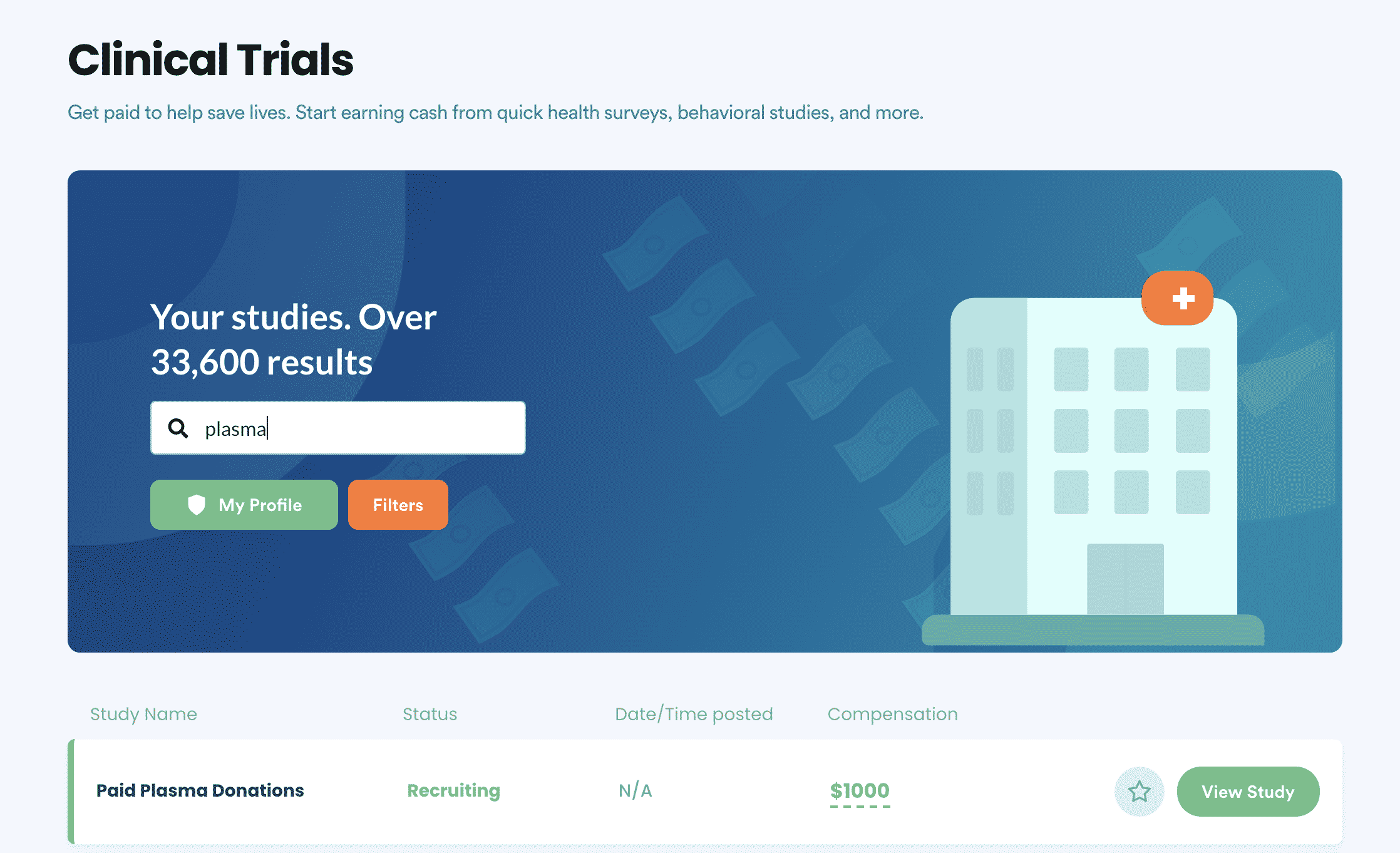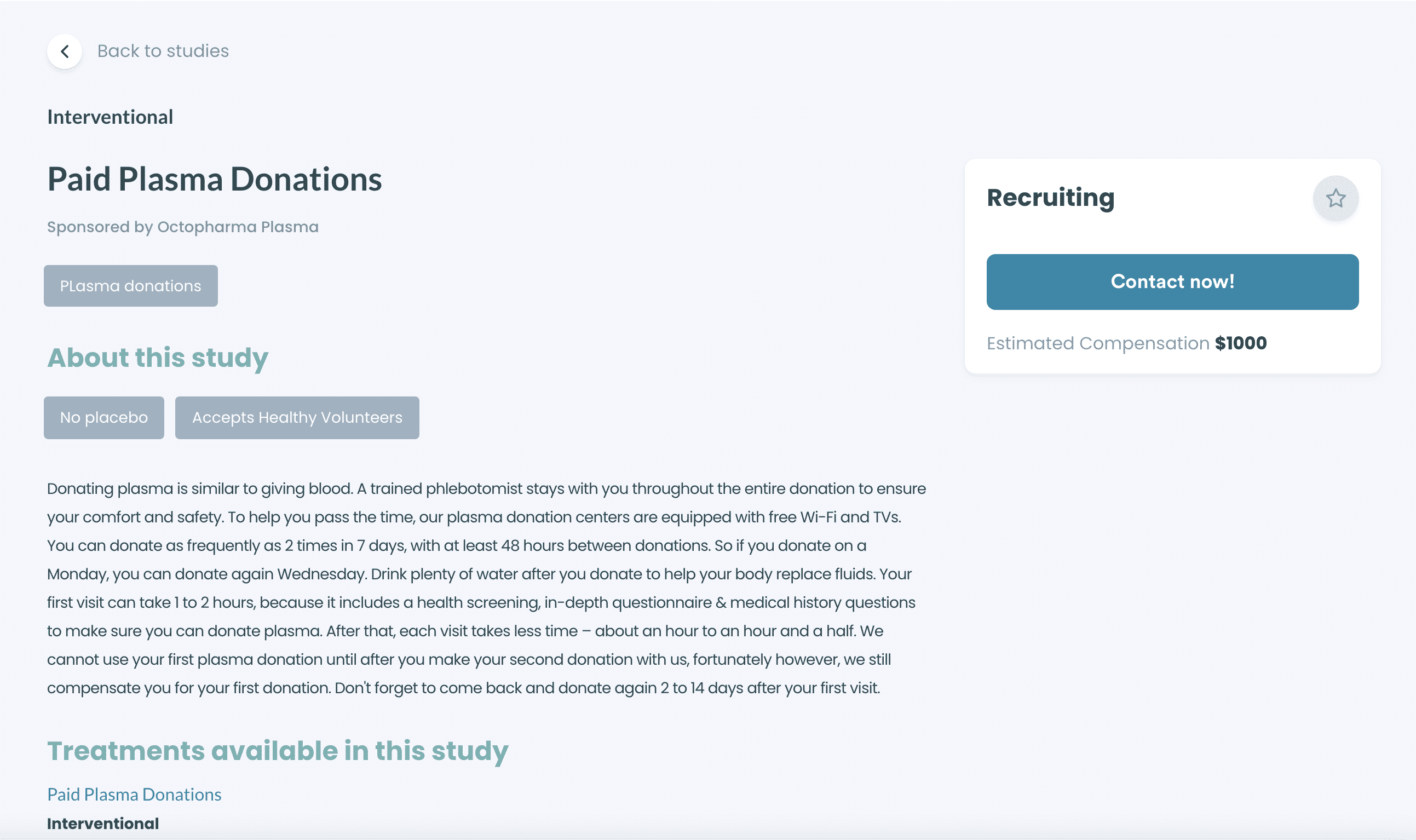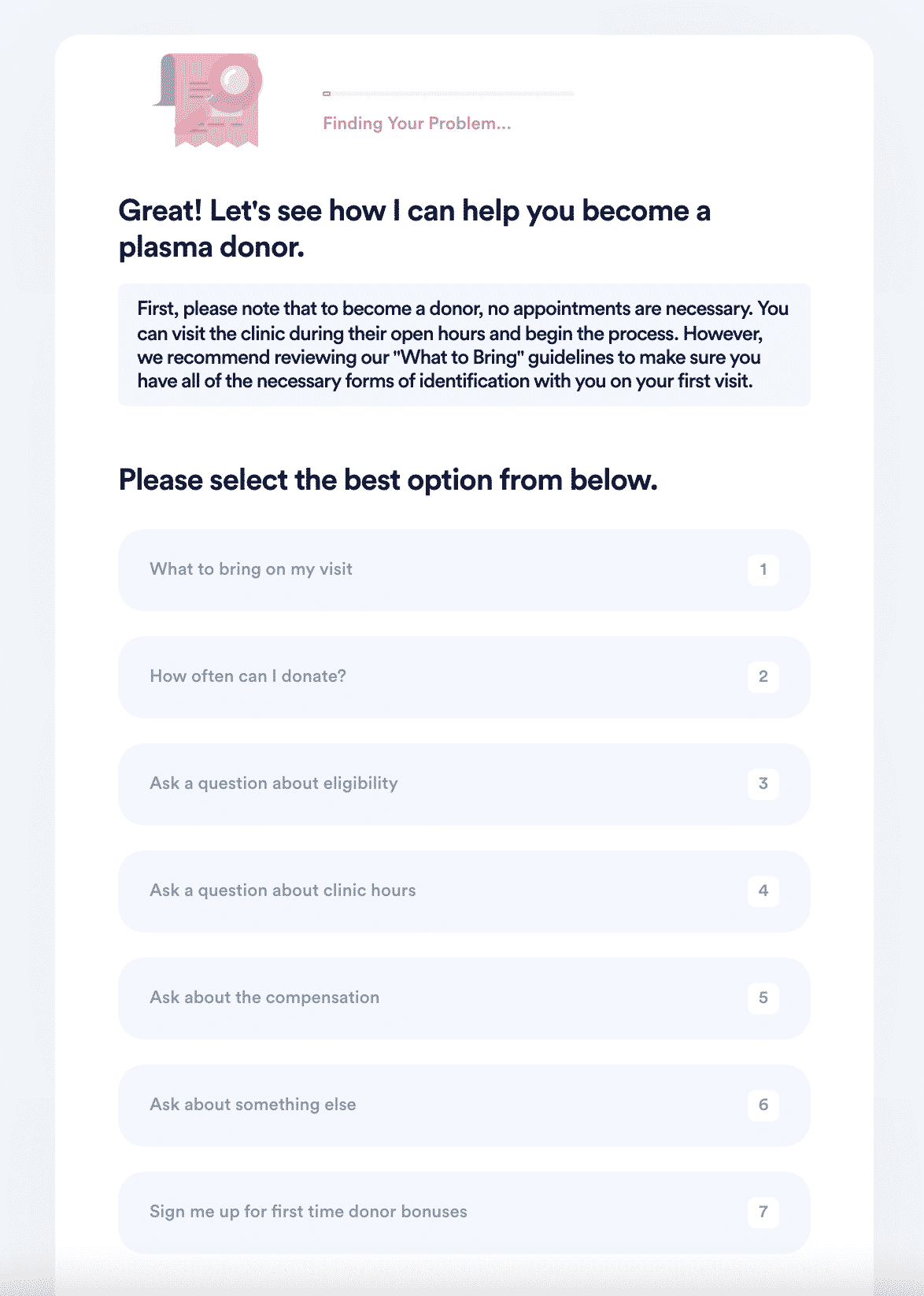Can I Switch Plasma Donation Centers
A plasma donation center is a place where people can donate their blood to be processed into various types of therapies. These centers are typically located near hospitals and medical facilities, but some might be found in a nearby community or town that needs the services provided. Generally, you can if you need one that is closer to your home.
One of the easiest ways for earning extra cash is through plasma donation, but it can be confusing to know which center to pick. DoNotPay can help with plasma donation center selection so you can earn extra money with ease.
What Is Plasma/Why Donate Plasma?
is the yellow-colored liquid that can be found in your blood. It's composed of 90 percent water and the other 10 percent consists of electrolytes, hormones, enzymes, and proteins such as albumin, globulin, and fibrinogen.
Blood needs to be pumped all around your body by the heart so it can carry oxygen and nutrients to tissues and organs to keep you alive. This pumping action moves the plasma (the liquid part of the blood), and the red and white blood cells remain in place.
Plasma is used primarily to help patients with severe burns, cancer, and patients who have lost a lot of blood due to trauma or surgery. Plasma can also be made into other products that assist with clotting disorders such as hemophilia and immune deficiencies.
How Is Plasma Donated?
After you've been given a health screening, you'll be escorted to a donor room with reclining chairs where the plasma is collected via your bloodstream using a machine called a cell separator or automated plasmapheresis device. A needle is inserted into your arm and blood is drawn through the tubing into the machine which separates your plasma from red and white blood cells.
(Donating whole blood is when you allow your entire quantity of blood to be collected in a bag can while donating plasma only removes the liquid part.)
How Long Does It Take?
When you donate plasma, it may take up to two hours for approximately 450 milliliters of plasma to be drawn into collection bags. If you donate platelets, it will take approximately three hours for enough platelets to be collected for transfusion.
Donating Plasma for Extra Cash
Donating plasma for cash is an easy way to make some extra money. You can go to a donation center near you and give a fraction of your blood plasma in exchange for cash. Most donation centers will offer you around $20-$50 per donation, depending on the amount of plasma they take.
If you're looking for an easy way to make some extra money, donating plasma is a great option. It's a simple process, and you can do it at a donation center near you.
Plasma Donor Eligibility Requirements
There are several common eligibility requirements for plasma donation centers:
| Age | You must be 18 years or older to give plasma. |
| Weight | You must weigh a minimum of 110 pounds. |
| Identification Cards | You'll need a photo I.D. and Social Security card with you on the day of donation. |
| Health Check | You must be free of cold and flu symptoms on the day of donation (if you feel like you may be coming down with something, it's best to reschedule your plasma donation until you're better). |
How Often Can You Donate Plasma?
Most of the nation's plasma collection centers allow donors to give up to two times every seven days (56 times per year), but this is often determined by local laws. Some states allow donors to give plasma more than twice in seven days, but you must be eligible for at least two donations per week.
Once your eligibility is established, another important factor is your weight. An average donor may expect to donate plasma around four times a month, depending on their age and weight. Generally speaking, the bigger you are, the more plasma you'll be able to give.
How to Switch Plasma Donation Centers
Plasma centers in the United States and Canada are independent and do not receive compensation from one another. Because of this, you can donate plasma at any center that is part of your local network.
If you're looking to donate plasma for money, but aren't completely satisfied with your experience or aren't sure if it's worth your time, then it's easy to switch plasma donation centers.
All you have to do is call the center that you're currently donating to and ask if they are in your local network. If they are, ask how to become a donor with them. They will likely send you an application through email or use their online form on their website. Once you've sent in your application, you'll receive a call from the center to schedule your first appointment.
Things to Keep In Mind Before Donating Plasma
If you're planning to give a plasma donation, there are several things you'll want to keep in mind:
- You'll need to eat a meal before donating plasma.
- Take along something to do or listen to since you'll be in the center for around two hours.
- Don't worry if you feel tired after donating plasma, this is normal.
- Be sure to drink plenty of fluids on the day of donation-this prevents dehydration and ensures your body gets enough water.
- As with all medical procedures, there are always some risks involved. Plasma donation is considered a safe process by the majority of donors and they have no side effects afterward.
How to Donate Plasma for Cash
If you're looking for a quick way to make extra money, donating plasma is an easy and simple process. Here's what you need to know:
- Look for a plasma donation center near you by typing in your city or state into the search box at Donating Plasma.
- Call the plasma donation center to ask about their policies, hours, and how often you can donate plasma.
- Fill out the necessary paperwork before donating plasma so you don't waste time at the center.
- Rest and drink plenty of fluids before donating plasma since you'll be sitting or standing for over two hours.
- Bring a form of I.D., Social Security card, and photo identification with you when you go to donate plasma so that the plasma donation center can confirm your identity as well as ensure you are able to donate.
- Have a small snack-like fruit or juice before donating plasma so you don't faint after giving blood.
- Donate plasma as often as the plasma donation center allows, but never more than twice within one week.
- Report any side effects or discomfort that may occur after donating plasma to the plasma donation center.
How to Donate Plasma Using DoNotPay
DoNotPay can help you donate plasma by walking you through the eligibility requirements and paperwork process. We'll also help you find a plasma donation center near you.
Here's how you can use DoNotPay to become a plasma donor:
- Search "plasma donations" on DoNotPay and find the nearest donation clinic through our clinical trials product.

- Select the "Contact Now" button to learn more about eligibility criteria, contact the clinic with questions, or sign up for first-time donor bonuses.

- Verify your information and submit your inquiry! DoNotPay will contact the clinic on your behalf and make sure your questions get answered.

Why Use DoNotPay to Become a Plasma Donor?
Donating plasma is an easy way to make quick money every week, but many people are unaware of how simple it can be to become a donor.
DoNotPay makes donating plasma even easier by walking you through the process. We'll also help you find a plasma donation center near you so getting paid isn't a problem.
If you've been thinking about becoming a donor, now is the time to take the next step toward making money and helping those in need!
What Else Can DoNotPay Do?
DoNotPay can help you with many other issues, both big and small. You can create an account on DoNotPay to ask the world's first AI Consumer Champion any question you may have.
Some of our most commonly asked questions are:
- How can I appeal a banned account?
- How can I return an item I bought?
- How do I complain about noisy neighbors?
- How do I make a request under the Freedom of Information Act?
- How do I dispute a seatbelt ticket?
Try DoNotPay for yourself to see how much time and energy you can save!


